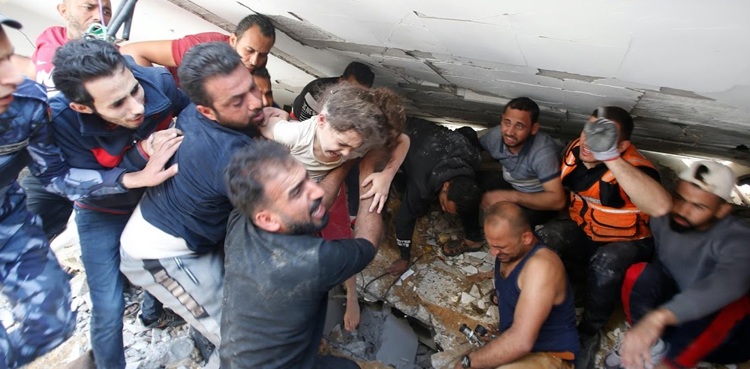The entry of aid convoys into embattled Gaza is a big step forward but the situation in the enclave remains catastrophic, a spokesperson for the World Food Programme (WFP), a Rome-based UN agency, said on Monday.
In an interview with UN News, an information website, the agency’s Spokesperson Alia Zaki emphasized that shortage of fuel was a major concern. Without it, hospitals and bakeries could simply grind to a halt.
While UN agencies and aid workers were working flat out to get aid in, they were confronted with the need to reduce rations and prioritize the distribution of food and other essentials. she added.
Jerusalem-based Ms. Zaki also stressed the urgent necessity for a humanitarian ceasefire, which would allow aid workers to deliver supplies in safety for both themselves and those in need.
The number of people killed in Gaza has reached 5,087, according to the latest reports from Palestinian authorities there, amid intensifying Israeli airstrikes.
Meanwhile, UN health agency (WHO) chief Tedros Adhanom Ghebreyesus issued a new appeal on Monday for “sustained safe passage” for medical essentials and fuel to keephealth facilities open. “Lives depend on these decisions,” he insisted on social platform X.
Latest media reports citing the Gaza Ministry of Health indicate that the number of people killed in Gaza since October 7 has risen to 5,087.
Women and children have made up more than 62 per cent of the fatalities, while more than 15,273 people have been injured.
In its latest humanitarian update on the Gaza-Israel crisis, UN humanitarian aid coordination office, OCHA, said that more than 1,000 had been reported missing and “are presumed to be trapped or dead under the rubble”.
According to Israeli official sources quoted by OCHA, some 1,400 people have been killed in Israel, the vast majority in the Hamas attacks on October 7 which triggered the latest conflict.
OCHA said that the reported fatality toll was “over threefold the cumulative number of Israelis killed” since it began recording casualties in 2005.
At least 212 Israeli and foreign nationals are being held captive in Gaza, the Israeli authorities have said. Two hostages were released last Friday. UN Secretary-General António Guterres has repeatedly called upon Hamas to release hostages immediately and unconditionally.
According to media reports, a new aid convoy entered Gaza from Egypt on Monday through the Rafah border crossing. This was the third such delivery after the crossing opened on Saturday for the first time since the start of the conflict, following intense diplomatic efforts.
A total of 34 trucks with aid provided by the UN and the Egyptian Red Crescent entered the enclave over the weekend. The UN has stressed that to respond to soaring humanitarian needs, at least 100 aid trucks per day are required.
The development comes as UN agency for Palestine refugees (UNRWA) warned on Sunday that it was set to run out of fuel within three days, putting the humanitarian response in Gaza at risk.
UNRWA head Philippe Lazzarini said that without fuel, “there will be no water, no functioning hospitals and bakeries” and that “no fuel will further strangle the children, women and people of Gaza”.
Meanwhile, OCHA said that more than 625,000 children in Gaza had been deprived of education for at least 12 days, and 206 schools had been damaged. At least 29 of them were UNRWA-run establishments.
UNRWA reported on Sunday that 29 of its staff members had been killed in Gaza, half of them teachers.
In the occupied West Bank, the escalation has also resulted in restrictions on the access to education. OCHA said that all the schools inside the territory were closed from October 7 to 9, affecting some 782,000 students. As of last week, over 230 schools which cater to some 50,000 students had not reopened.


Leave a Comment